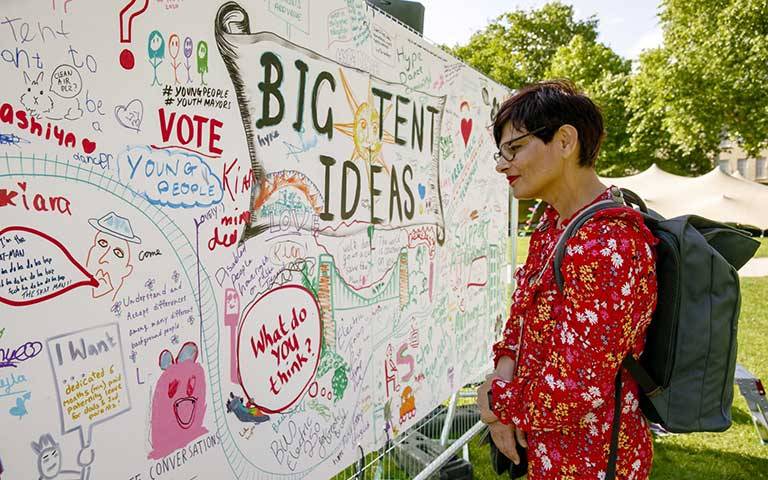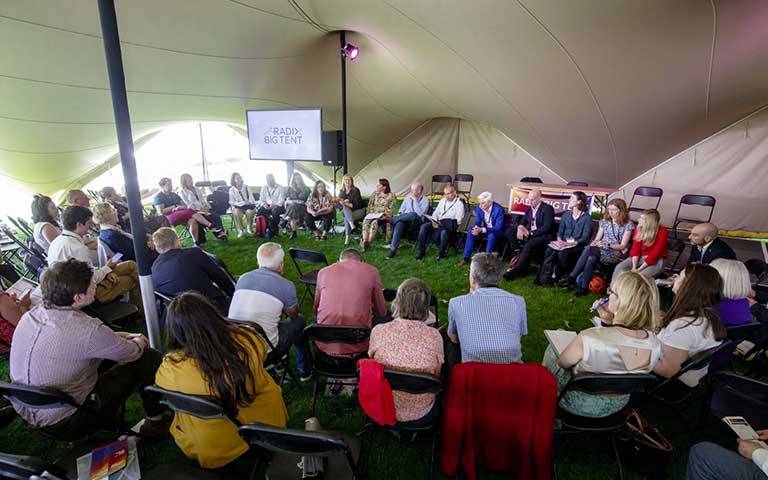Panel discussion at Bristol: “We could stop climate change early, but should we?
13 June 2022
The Big Tent is a charitable foundation dedicated to creating space for non-partisan conversations about big policy issues and to giving a voice to places and people left-behind, particularly focused on regeneration.

Dr. Pete Irvine spoke at a panel discussion at the Radix Big Tent Ideas Festival in Bristol on the 11th of June. He discussed the unique opportunities, challenges and risks of dimming the sun in a tent on a sunny afternoon with Prof. Matt Watson, Inderpaul Johar and the chair Deborah Cohen. They were joined by an audience of civil servants, policymakers and community organisers.
The event was organised by Radix and Big Tent, a collaboration that seeks to improve public policy by creating spaces where new ideas can be discussed by policymakers in a non-partisan way. Radix is a non-aligned thinktank that aims to promote the transition to a sustainable society by challenging received wisdom in the political establishment and helping policymakers to recognize and implement new ideas and technologies. Big Tent is a charitable foundation that aims to support non-partisan discussions about major policy issues by convening events which can make this possible.
The 1-day event was held at Bristol’s Queen Square on a sunny day in June in a series of open tents, giving it a relaxed festival atmosphere. The theme of the annual event this year was “Transitions”, and covered a range of important topics from regenerating cities and achieving net-zero emissions, to the future of media and the role of big data in public services. Several politicians were present including, Sir Vinc Cable, Ed Davey MP, Stephen Kinnock MP, as well as business people including Bruce Daisley, the former head of Twitter in Europe.

Caption: Radix Big Tent ideals festival, Bristol. Image credited to Rahil Ahmad @stolenoranges
The panel discussion was titled: “We could stop climate change early, but should we?” and was chaired by Deborah Cohen, the former Executive Editor for Science Radio at the BBC. There were opening statements, questions from the audience, and a final yes / no question from Deborah: “Will solar geoengineering ever be deployed?”
Prof. Matt Watson, a volcanologist at Bristol University and the Principal Investigator on one of the UK’s only funded research projects on solar geoengineering gave the first opening statement. He explained the lessons that can be learned from studying volcanic eruptions, the inspiration for stratospheric aerosol geoengineering. In his answers to questions, he stressed the political challenges that geoengineering raises, drawing on his experience leading a research project which included a field experiment that generated considerable controversy and was ultimately cancelled. Prof. Watson concluded that solar geoengineering won't be deployed as the political challenges seem too great.
Dr. Pete Irvine, a lecturer in the Earth Sciences department at UCL who studies solar geoengineering, was second up. He explained that stratospheric aerosol geoengineering is feasible and seems to offer a way to greatly reduce the risks of climate change. He noted that while it is imperfect and has several negative side-effects, he suggested there may be the potential for international cooperation. Dr. Irvine concluded that yes, solar geoengineering would be deployed, as while he’s uncertain, he wanted to balance Prof. Watson’s definitive no.
The final speaker was Inderpaul Johar, Founder of Dark Matter Labs, an organization that aims to build next generation institutions for the climate transition. Inderpaul thought that while solar geoengineering had promise, it was likely to be abused. He suggested that it would give nations an excuse to continue with a fossil-fueled business-as-usual that would be too tempting to resist. He concluded that solar geoengineering would be deployed but that it would be used selfishly and destructively by the powerful.
Solar geoengineering is a controversial idea and if it is to be further developed or abandoned then further discussions at events like the Radix Big Tent festival ideas will be essential.
Images:
All images credited to Rahil Ahmad @stolenoranges
 Close
Close

